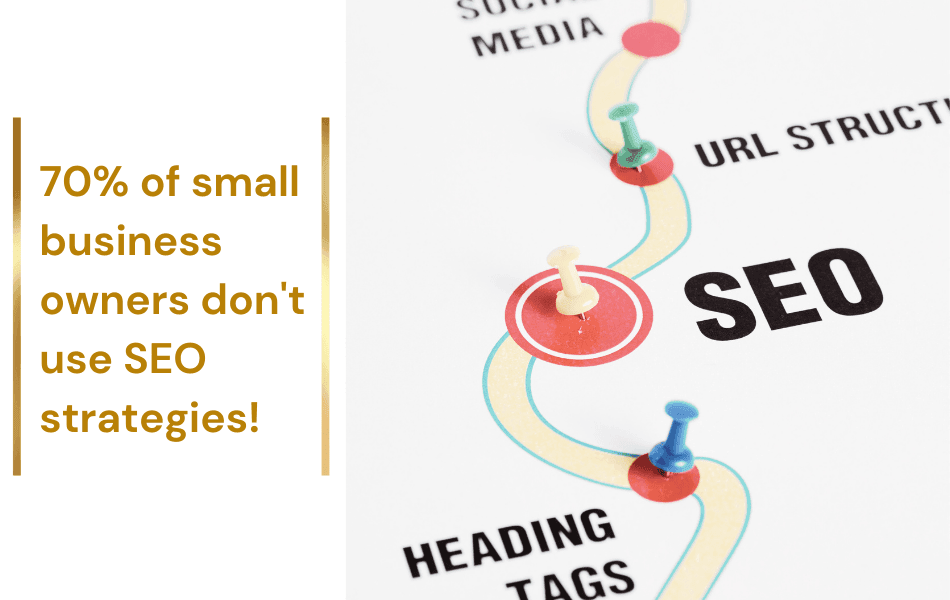Is SEO Worth it for Small Businesses?

SEO Brings Value to Your Small Business.


Table of Contents
Key Highlights
- It is very important for small businesses to succeed online now.
- It helps you get noticed, attract the right customers, and increase sales.
- It has different strategies like keyword research, content creation, link building, and quick fix for technical issues.
- To know if your SEO is working, it’s key to track key performance indicators (KPIs) and use analytics tools.
- It takes much time to show results, so you need to keep working at it and stay aware of changes in algorithms.
Introduction
In today’s online world, small businesses need a strong online presence. Approximately 68% of internet users tend to depend on a search engine for their online interactions.
While old-fashioned marketing still has its value, digital marketing is more effective. Among all digital marketing methods, Search Engine Optimization (SEO) shines as a useful tool.
It helps small businesses compete better and grow in a steady way. But, 70% of small business owners don’t use SEO strategies.
This leads us to ask: Is SEO worth it for small business?
In this simple guide, we will look at the important reasons why search engine optimization is not just helpful but necessary for small business owners to do well online.

Understanding SEO and Its Impact on Small Businesses
Before we get into the details, let’s understand SEO and why it matters.
Search engine optimization means improving your website and its relevant content to rank higher in search engine results pages (SERPs) like Google.
The better you rank for relevant keywords, the more people will see your website. This visibility helps potential customers find the products or services you offer.
For small businesses, it is more about attracting the right visitors – those who are looking for what you sell.
By making your website match user search intent, SEO helps bring in traffic that is more likely to turn into leads, sales, and loyal customers.
Defining SEO in the Context of Small Businesses
Imagine this: a person nearby needs plumbing help fast. They quickly go to Google and search for “emergency plumber near me.“
For your small plumbing business to show up in these results, you need a strong SEO strategy. Search engine optimization includes different methods and best practices to boost your website’s ranking in organic search results without paying for ads.
Small businesses usually focus on specific areas or types of services. Your target audience is more narrow, making it very effective.
Use target keywords, make local content, and keep your Google Business Profile updated, will increase your chances of showing up in local searches.
This means more people see your business and, in turn, more customers visiting, asking about services, and buying.
SEO connects your small business to potential customers who are looking for help. It helps make you more relevant and visible to the people who matter most – your ideal customers.
The Role of SEO in Digital Marketing Strategies
In your digital marketing plan, SEO is the base for everything else. A good strategy makes sure that people can find your website easily.
It keep your site engaging for both search engines and users. While other marketing methods, like social media and ads, work best when you have a solid SEO foundation.
It is about connecting with your target audience, building relationships, and making your brand respected in your field.
It boosts your other marketing efforts. This helps you reach more people and get a better return on your investment.
The Benefits of SEO
The benefits of SEO for small businesses are many.
- They go beyond just getting more visitors.
- Small businesses can compete effectively for online visibility with bigger companies.
- They can gain long-term advantages for steady growth.
Let’s look at some important benefits:
- Improved online visibility and brand recognition.
- Enhances user experience and provides a cost-effective way to market.
- It gives small businesses the chance to build a strong presence.
- Reach your goals in a crowded digital world.

1. Enhancing Online Visibility and Brand Awareness
The online market is competitive, and small businesses must stand out to be noticed.
SEO enhances website visibility in search, boosting brand awareness, trust, and credibility.
Getting high rankings for target keywords makes your brand memorable, ensuring it’s top-of-mind during purchase decisions.
A solid strategy links your brand to values and services, establishing authority within your target market.
2. Driving Targeted Traffic to Your Website
Not all web traffic is equal, making quality matters more than quantity.
It attracts targeted users interested in products or services like yours. You may need to improve your site with targeted keywords and compelling content to attract genuinely interested visitors.
Think of SEO as a magnet pulling in potential customers who want what you offer.
Reaching the right audience through organic search ensures that website traffic helps achieve business goals. Know that SEO maximizes clicks for better engagement, conversions, and business growth.
3. Improving User Experience and Website Usability
SEO improves user experience by ensuring fast loading, mobile compatibility, and easy navigation.
A positive experience leads to increased engagement and lower bounce rates, signaling search engines that your content is valuable.
This cycle of good SEO and experience can boost search rankings.
How SEO Evens the Playing Field for Small Businesses?
You can compete with bigger companies online. We all know that larger companies often have much money and resources.
- You can target specific markets and enhance your online presence for certain keywords.
- You can show up in search results right alongside larger players.
- You attract local customers who are looking for what you offer.
Small businesses can stand out in the digital world and challenge big corporations.
1. Competing with Larger Companies in Search Rankings
Imagine this: someone searches for a product or service you offer. With strong SEO, your small business can outrank bigger competitors on search engine results pages.
This boosts visibility and attracts new customers you may not have reached before.
Local SEO is crucial for small businesses to stand out in local searches and connect with nearby customers.
To achieve this, you may need to optimize for local keywords, create local listings, and manage your Google Business Profile.
End of the day, you get to attract shoppers who prefer supporting local businesses.
2. Cost-Effective Marketing Compared to Traditional Methods
Small businesses often have small marketing budgets. Compared to traditional marketing methods like print ads or TV commercials, search engine optimization offers a better return on investment.
While it requires time and resources, the long-term benefits are worth it.
Unlike paid ads, SEO continues to work even after the initial effort, leading to ongoing growth in free traffic.
You gain valuable data and insights to shape overall marketing plans. Analyze website traffic, user behavior, and keyword performance. With these insights, you tailor your marketing efforts, for maximum results.
Key SEO Strategies
Now we understand SEO’s importance, let’s explore strategies to start your journey.
Focus on:
- Local search optimization and Google Business Profile
- Engage your audience with content
- Build quality backlinks.
These steps enhance your brand visibility, attract your target audience, and aid growth through organic search.

1. Optimize for Local Search and Google Business Profile
Local SEO helps your business show up higher in search results for your area, especially in Google Maps. Individuals searching for nearby businesses typically intend to visit those establishments, with 76% seeking to do so within 24 hours.
Say, you own a bakery in Seattle, you may want to be found when someone searches for “best bakeries Seattle” or “bakeries near me” in Seattle.
How?
- Start by claiming and managing your Google Business Profile (GBP) listing.
- Make sure all the information is correct and up-to-date.
- Use relevant keywords in your business description.
- Choose the right categories and add good-quality images to show what you sell.
- Ask happy customers to leave reviews especially positive reviews.
- Use local keywords naturally. Say something like “we offer catering services in Seattle.”
By focusing on your local area will help you attract people near you who are looking for what you offer.
2. Create Quality Content That Addresses Customer Needs
Content marketing is crucial for search engine optimization success.
- Create high-quality, informative content that meets your audience’s needs.
- Address their questions and offer unique solutions.
- Use various formats like videos, how’s to, listicles and infographics to engage different learning preferences.
Quality content on your web pages attracts and retains your audience while aiding in link building for improved search engine visibility.
3. Build Backlinks from Reputable Sources
Backlinks in act as endorsements from other sites, signaling to search engines the quality and trustworthiness of your content.
Focus on acquiring backlinks from reputable websites in your niche through:
- Guest blogging
- Industry forums
- Collaborations.
Quality trumps quantity when it comes to backlinks.
Build strong relationships and create valuable content to naturally attract high-quality backlinks. This will boost your website’s authority and improve its search ranking over time.
Common SEO Mistakes You Should Avoid
SEO has great potential, but it also has some problems. Those that are new often make these mistakes.
These mistakes can slow down your progress or even harm you efforts. You can do better by knowing and avoiding these common problems.
1. Ignoring Mobile Optimization and Site Speed
A mobile-friendly website is crucial to retain customers and maintain search engine rankings.
How?
- Ensure your site functions well on all devices, with fast loading speeds.
- Optimize images and utilize browser caching.
- Choose reliable hosting services.
2. Overlooking Analytics and SEO Metrics
SEO requires continuous monitoring and adjustments to ensure effectiveness.
Tool like Google Analytics provide valuable insights into website performance.
Use it to track key metrics like organic traffic and conversion rates.
Analyzing data helps you understand user behavior, refine strategies, and enhance website performance for optimal results.
Regularly reviewing analytics and taking action based on insights is crucial for successful outcomes.
Measuring the Success of Your Efforts
Measuring SEO performance help shows the effectiveness of your strategies, validates investments, and guides future planning.
Success goes beyond tracking website traffic; it’s about driving results that impact profitability.
Set clear goals that fit with your main business plans.
This could be:
- Increasing organic traffic.
- Getting more leads.
- Driving sales.
- Improving brand awareness.
Having specific goals helps you check if your efforts are paying off.
Regularly track and look at these numbers. You will find parts that need improvement and make choices based on the data.
1. Set Realistic SEO Goals
Focus on setting achievable goals instead of targeting highly competitive keywords.
It takes time, effort, and regular updates.
When setting goals:
- Think about how competitive your industry is.
- How strong your website is.
- The resources you have available.
Begin with achievable objectives like enhancing rankings for long-tail keywords or boosting local organic traffic.
Celebrate small victories and stay motivated for ongoing improvements.
2. Tools for Tracking SEO Performance
There are many SEO tools that can track how your website is doing, analyze data, and help boost your search engine rankings.
These tools offer insights on visibility, traffic sources, keywords, backlinks, and more.
| Tool | Description |
| Google Analytics | A free web analytics service offered by Google that tracks and reports website traffic. Key features: Website traffic data, user behavior analysis, conversion tracking, goal setting. |
| Google Search Console | A free web service by Google that allows website owners to monitor and manage their website’s presence in Google search results. Key features: Index coverage reports, keyword performance tracking, mobile usability analysis, sitemap submission. |
| SEMrush | A comprehensive toolkit that offers a wide range of features for keyword research, competitor analysis, backlink analysis, and more. Key features: Keyword research tool, competitor analysis, backlink audit, site audit, rank tracking. |
| Ahrefs | A powerful toolkit that provides in-depth data and insights into website traffic, backlinks, keywords, and competitor analysis. Key features: Backlink analysis, keyword research, content explorer, rank tracker, site audit. |
| Screaming Frog SEO Spider | Crawls your site to find broken links, duplicate content, and technical SEO issues. Key features: Detect broken links, analyze metadata, identify duplicate content, and find technical SEO issues like redirects and crawl errors. |
| Moz | Tracks keyword rankings, domain authority, and offers improvement suggestions. Key features: Keyword tracking, domain authority monitoring, backlink analysis, and actionable recommendations for website optimization. |
By leveraging these tools and techniques, you can track your website’s progress, identify areas for improvement, and measure the effectiveness of your efforts.
Remember, data-driven decisions are key to achieving sustainable results.
Conclusion - Is SEO worth it for small business?
In conclusion, yes – SEO is worth it for small business.
It boosts visibility and online experience, attracting more visitors. You can compete cost-effectively by optimizing locally, creating good content, and building backlinks.
Avoid mistakes like neglecting mobile optimization and analytics. Set achievable goals and track progress to measure success.
With proper strategies, SEO aids in expanding your digital presence and reaching your target audience efficiently.
Frequently Asked Questions
How Long Does It Take to See Results?
The time it takes to see clear results can depend on many things. These include how much competition is in your industry and the current condition of your website. Generally, small businesses usually notice a good change in organic traffic and search rankings after running a solid SEO campaign for about 4 to 6 months.
Is SEO Affordable for your Budgets?
Yes, the cost is very affordable. This is true, especially when you think about the long-term benefits. You can use many cost-efficient SEO services. You can hire freelance consultants or use DIY tools. This makes it a wallet-friendly way to market, with a great chance for high returns on investment.
Is SEO Worth it for Small Business?
Yes, as it enhances visibility and search engine rankings. Optimizing your website with keywords, quality content, and user-friendly design attracts organic traffic, boosting sales and leads. Investing in SEO establishes a strong online presence and keeps you ahead of competitors in the digital market.
Does SEO really work?
Yes. it can greatly benefit you by boosting visibility, driving organic traffic, and reaching potential customers actively searching for your offerings. Improved search rankings make your business easier to be found online, while local SEO can target customers in your area, enhancing growth and success in the digital age.
